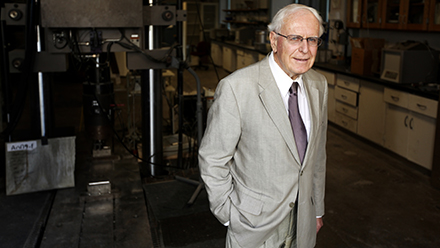Zdeněk Bažant Elected a Royal Society of Canada Fellow
Bažant is one of 104 fellows elected to this year’s class
Northwestern Engineering’s Zdeněk P. Bažant has been named a fellow of the Royal Society of Canada (RSC) as part of the Class of 2024.
Bažant, McCormick Institute Professor and Walter P. Murphy Professor of Civil and Environmental Engineering at the McCormick School of Engineering, is one of 104 fellows elected to this year’s class. Bažant’s research interests lie in new interdisciplinary problems of the mechanics of solids and structures, with applications in structural, mechanical and aeronautical engineering, materials science, geophysics and petroleum engineering.

Bažant was cited by the RSC for transformational scientific contributions shaping frontiers of solid mechanics and engineering, particularly in concrete, aircraft composites, ice and rock. His accomplishments include discovering the size-effect law for quasibrittle fracture, the size-effect method for fracture energy testing, and the gap test. He also developed the microplane material model, crack-band theory, nanopore adsorption-based concrete creep law capturing hygrothermal effects, and Gauss-Weibull and fishnet probability distributions of strength of heterogeneous materials.
“The Royal Society of Canada is very proud to welcome today an imposing group of inspiring scholars, artists, and creators whose peers have recognized their exceptional contributions to the world of science and culture and to the well-being of Canada,” said Alain-G. Gagnon, president of the RSC. “The impact of their work will continue to be felt in the development of public policies for years to come, while contributing to the well-being of our society.”
With a PhD from CSAV Prague earned in 1963, Bažant joined the Northwestern Engineering faculty in 1969. He is well-known for his definitive analyses of the collapse of the World Trade Center towers on September 11, 2001, and of the excessive deflection and subsequent tragic collapse of the Koror-Babeldaob Bridge of record span in Palau in 1996. His work has been implemented at structural engineering firms and companies such as Boeing, Chrysler, and Ford, and has improved the safety, sustainability, and efficiency of structures such as bridges, dams, buildings, aircraft, cars, ships, sea ice, and nuclear containments.
Bažant’s work has earned him several prestigious commendations. He’s a member of the National Academy of Sciences, National Academy of Engineering, and the Royal Society of London. He’s also a member of the national academies of Austria, Japan, Czech Republic, India, Italy (Lincei), Greece, and Spain. In 2016, he received the Austrian Cross of Honor for Science and Art. The American Society of Civil Engineers (ASCE) and American Society of Mechanical Engineers (ASME) established well-endowed medals bearing his name. He received the top medals and awards from the ASCE (von Karman, Freudenthal, Biot, Newmark), the ASME Medal (and Timoshenko, Nadai), SES (Pager), Society for Experimental Mechanics (Murray), American Society for Composites (OCA), American Concrete Institute (Boase), International Union of Laboratories and Experts in Construction Materials, Systems and Structures (L’Hermite), and more.
He is an honorary member of the ASCE, ASME, ACI and the International Union of Laboratories and Experts in Construction Materials, Systems and Structures. He’s received nine honorary doctorates: CTU Prague, UC Boulder, Politecnico Milano, TU Karlsruhe, INSA Lyon, TU Vienna, Ohio State University, the University of Minnesota, and UPPA France. In the 2019 filtered Stanford University citation survey, he came up no. 1 in CEE worldwide.